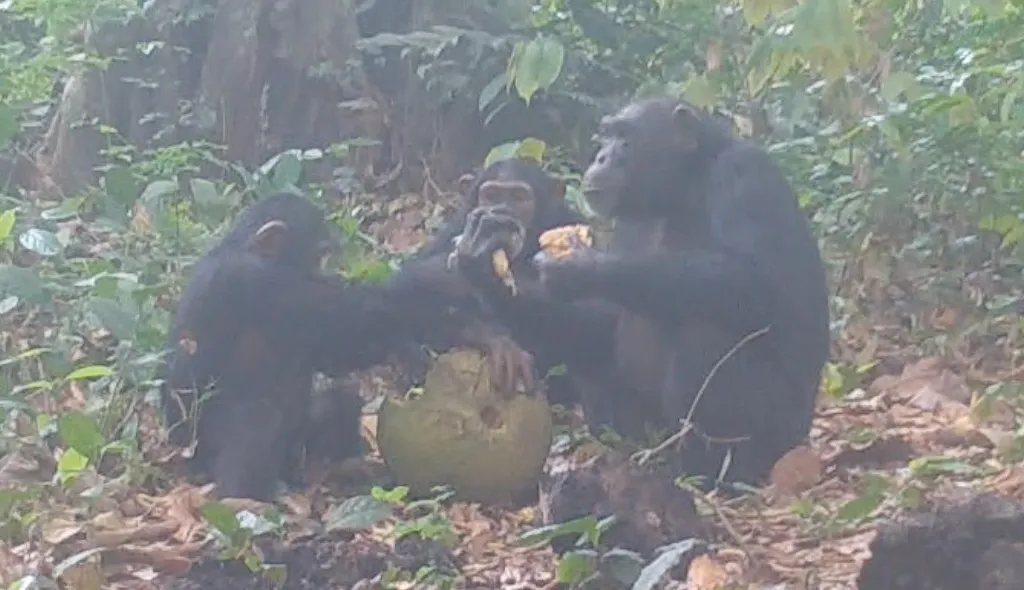Watch Wild Chimpanzees Share Alcoholic Fruit, a Behavior Just Captured on Video for the First Time
Watch Wild Chimpanzees Share Alcoholic Fruit, a Behavior Just Captured on Video for the First Time
Though the reason behind this action is unclear, researchers suggest socially consuming alcohol may have offered evolutionary benefits to a common ancestor of both humans and chimps
For the first time known to scientists, a team has documented chimps sharing alcoholic fruit.
Anna Bowland / Cantanhez Chimpanzee Project / University of Exeter
For the first time, scientists have documented chimpanzees in the wild eating and sharing boozy, fermented fruit.
The research team has tentatively compared the behavior to social drinking among humans, suggesting that alcohol consumption may have provided an evolutionary benefit for the common ancestor of our species and chimpanzees. They shared the new findings in a study published Monday in the journal Current Biology.
While chimpanzees have previously been observed consuming alcohol and sharing food, this marks the first time scientists have documented it happening simultaneously, reports the Washington Post’s Leo Sands. Nevertheless, “we suspect that this isn’t a rare occurrence and that actually the sharing of fruit that have a level of alcohol is probably relatively widespread,” Anna Bowland, lead author of the study and an ecologist from the University of Exeter in England, tells the Washington Post.
Bowland and her colleagues captured the footage by setting up motion-activated cameras in Cantanhez National Park, Guinea-Bissau, in West Africa. The cameras filmed wild chimps sharing fermented African breadfruit ten separate times. The researchers tested the fruit’s alcohol content between April and July 2022, and they found that the highest quantity would correspond to 0.61 percent alcohol by volume (ABV) in a beverage.
That’s a pretty low concentration—an average beer, for example, might be 5 percent ABV. But study co-author Kimberley Hockings, a researcher in ecology and conservation at the University of Exeter, says the chimps “can feed on kilograms of the stuff every day,” as reported by the Guardian’s Steven Morris. “It’s probably analogous to us sipping on a light beer.”
Chimps Seen Sharing Boozy Fruit In The Wild For The First Time
Watch on
“For humans, we know that drinking alcohol leads to a release of dopamine and endorphins and resulting feelings of happiness and relaxation,” Bowland explains in a University of Exeter statement. “We also know that sharing alcohol—including through traditions such as feasting—helps to form and strengthen social bonds. So, now we know that wild chimpanzees are eating and sharing ethanolic [alcoholic] fruits, the question is: Could they be getting similar benefits?”
Archaeological evidence of alcoholic beverages goes back thousands of years. If the observed behavior from the recent study does turn out to lend an evolutionary benefit to chimpanzees, it would suggest that both humans and chimps inherited a predisposition for social alcohol consumption from a common ancestor millions of years ago.
“If chimpanzees do it and humans do it—and they are our nearest relatives—then the likelihood is, everybody in between did it, too,” Robin Dunbar, an evolutionary psychologist at England’s University of Oxford who did not participate in the study, tells the Washington Post. “It’s much less likely that two closely related genera have evolved a capacity—even if it’s only a behavioral thing—independently of each other,” Dunbar adds. “It’s much more likely that it’s a common ancestral trait.”
While the scientists admit further research is needed, their study indicates that the origins of “feasting” traditions could go back millions of years. Far from humans, however, chimpanzees are unlikely to get drunk, since that would threaten their chances of surviving in the wild.
Get the latest stories in your inbox every weekday.


